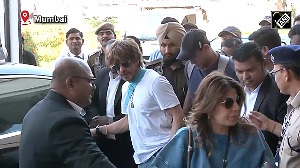 Delhi high court on Friday refused to interfere with the ban on a controversial BBC documentary, 'India's Daughter' on the December 16 gang rape case, saying the issue of its telecast was pending before the trial court which was competent to deal with it.
Delhi high court on Friday refused to interfere with the ban on a controversial BBC documentary, 'India's Daughter' on the December 16 gang rape case, saying the issue of its telecast was pending before the trial court which was competent to deal with it.
A bench of Chief Justice G Rohini and Justice Jayant Nath also did not go into the validity of an advisory issued by the Centre against telecast of the short film, saying that it was only an advice to private TV channels and the documentary was not shown because of the restraint order of the trial court.
"So far as the judicial orders of March 3 and March 4, 2015 (banning telecast of the documentary) are concerned, since the matter is pending before the competent court of law and more particularly the investigation is still in progress, the interference by this court either under Article 226 or under Article 227 of the Constitution is not warranted," the bench said.
The court also said, "It is apparent from facts borne out from the record that the advisory dated March 3, 2015, was a mere advice to the private TV channels. It appears to us that the documentary in question has not been telecast on account of the restraint order passed by the competent court of law.
"We, therefore, decline to enter into the various contentions advanced by the petitioners regarding the validity of the advisory issued by the ministry of information and broadcasting."
The decision came on the PILs by three law students seeking lifting of the ban on the documentary, which was shot inside Tihar Jail, on the ground that it was "a look at the mindset of one of the convicted rapists".
The bench disposed of the petitions while leaving it open to the trial court to proceed with the matter by following the due process of law and also granted liberty to the law students or any other aggrieved party to work out other remedies under the law.
On the night of December 16, 2012, Ram Singh, Vinay Sharma, Akshay Thakur, Pawan Gupta, Mukesh and a juvenile had gang raped a girl in a bus and beaten up her 28-year-old male friend, who was with her.
While the girl succumbed to her injuries on December 29, 2012 at a Singapore hospital, the victim's friend, suffered grievous hurt in the incident.
The juvenile accused was on August 31, 2013 convicted and sentenced to three years in a reformation home, while four others were handed down death penalty.
The counsel for Delhi Government had earlier told the bench that video of the documentary was available on the Internet and no one's fundamental right was affected due to this.
The documentary was made by Leslee Udwin and was broadcast by British Broadcasting Corporation (BBC). It was banned by the government after its contents, including the interview of one of the rapists who showed no remorse, triggered outrage.
Udwin had claimed that she took permission from the then Director General of Tihar Jail Vimla Mehra to interview Mukesh in prison for BBC. Police said it is probing the matter.
The Information and Broadcasting ministry had on March 3 advised all news channels not to carry the story related to the interview of one of the convicts in the gangrape case.
The trial court had restrained airing or broadcasting the documentary in March last year.
The police, in its application filed before the trial court, had said that Mukesh Singh, the driver of the bus in which the girl was gangraped, has made insulting, malicious and derogatory statements about women.
They had said if the interview is telecast, it might lead to widespread public outcry and serious law and order problem as had happened in the aftermath of the gangrape case.
Police had registered an FIR in the matter and thereafter obtained an order from the court restraining the media from broadcasting, publishing or transmitting the interview.






 © 2025
© 2025